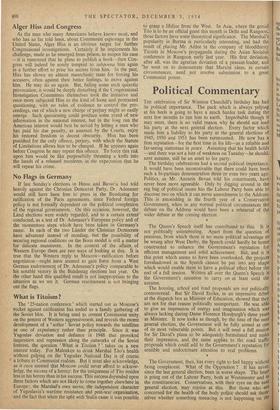What is Titoism?
The 25-nation conference' which started out as Moscow's rocket against ratification has ended as a family gathering of the Soviet bloc. It is being used to cement Communist unity on the pretext of Western aggressiveness, and reveals the recent development of a ' softer' Soviet policy towards the satellites as one of expediency rather than principle. Since it was Yugoslav deviation and defiance in 1948 that provoked inquisition and repression along the outworks of the Soviet fortress, the question ` What is Titoism ? ' takes on a new interest today. For Malenkev to drink Marshal Tito's health without gulping on the Yugoslav National Day is of course a tribute to Communist realism. But it must also acknowledge, as it once seemed that Moscow could never afford to acknow- ledge. the success of a heresy; for the uniqueness of Tito resides less in his heresy than in his success. This success depended upon three factors which are not likely to come together elsewhere in Europe: the Marshal's own nerve, the independent character of Yugoslavia's wartime resistance and post-war.organisation, / and the fact that when the split with Stalin came it was possible to grasp a lifeline from the West. In Asia, where the genial Tito is to be an official guest this month in Delhi and Rangoon, those factors have some theoretical significance. The Marshal's popularity in Burma is particularly interesting, and had the result of placing Mr. Attlee in the company of bloodthirsty Titoists in Moscow's propaganda during the Asian Socialist conference in Rangoon early last year. His first deviation, after all, was the agrarian deviation of a peasant-leader, and "he went on to demonstrate that Marxist ideas, in certain circumstances, need not involve submission to a great Communist power.










































 Previous page
Previous page